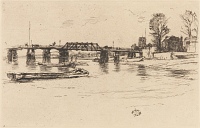Chelsea | ||
| Number: | 181 | |
| Date: | 1878/1879 | |
| Medium: | etching and drypoint | |
| Size: | 133 x 207 mm | |
| Signed: | butterfly at lower right | |
| Inscribed: | no | |
| Set/Publication: | Printseller's Association, 1879. | |
| No. of States: | 5 | |
| Known impressions: | 66 | |
| Catalogues: | K.182; M.179; W.148 | |
| Impressions taken from this plate (66) | ||
TECHNIQUE
Chelsea was originally done in pure etching, and drypoint additions were made from the third state on.
PRINTING
Mansfield stated that Francis Seymour Haden, Sr (1818-1910) had written '1st State - only two taken.', and 'Second trial from the plate.' on impressions that were bought later by Charles Lang Freer (1856-1919), and had also written on the last print in the sequence, '"Third trial printed by artist and impression set off," and "3rd state, set off while wet." ' 7 These inscriptions seem to have been mostly removed although the latter is partly visible on an impression of the third state ( ).
).
 ).
).7: Mansfield 1909 (cat. no. 179).
One of the first impressions was in black ink on laid paper with an 'IV' countermark ( ), as was the impression of the third state just mentioned (
), as was the impression of the third state just mentioned ( ), which was on paper taken from a book with an old Dutch inscription. Papers include sheets of off-white laid paper removed from a book, with sewing holes visible, used for proofs of the first and second state (
), which was on paper taken from a book with an old Dutch inscription. Papers include sheets of off-white laid paper removed from a book, with sewing holes visible, used for proofs of the first and second state ( ,
,  ).
).
 ), as was the impression of the third state just mentioned (
), as was the impression of the third state just mentioned ( ), which was on paper taken from a book with an old Dutch inscription. Papers include sheets of off-white laid paper removed from a book, with sewing holes visible, used for proofs of the first and second state (
), which was on paper taken from a book with an old Dutch inscription. Papers include sheets of off-white laid paper removed from a book, with sewing holes visible, used for proofs of the first and second state ( ,
,  ).
). Two impressions of the fifth state are on ivory laid paper from a ledger with ruled orangey-red lines ( ,
,  ). Others - stamped by the Printsellers Association - are on similar lined paper (
). Others - stamped by the Printsellers Association - are on similar lined paper ( ,
,  ). A variety of other papers used for the fifth state include other laid papers, cream (
). A variety of other papers used for the fifth state include other laid papers, cream ( ), 'antique' (pre-1800) cream (
), 'antique' (pre-1800) cream ( ) and an off-white laid with eagle watermark (
) and an off-white laid with eagle watermark ( ); ivory 'antique' laid paper darkened to cream (
); ivory 'antique' laid paper darkened to cream ( ); and dark cream laid with the watermark of 'GR' and Strasbourg Lily (
); and dark cream laid with the watermark of 'GR' and Strasbourg Lily ( ). One impression in dark brown ink was printed on a stiff, card-like cream wove paper (
). One impression in dark brown ink was printed on a stiff, card-like cream wove paper ( ).
).
 ,
,  ). Others - stamped by the Printsellers Association - are on similar lined paper (
). Others - stamped by the Printsellers Association - are on similar lined paper ( ,
,  ). A variety of other papers used for the fifth state include other laid papers, cream (
). A variety of other papers used for the fifth state include other laid papers, cream ( ), 'antique' (pre-1800) cream (
), 'antique' (pre-1800) cream ( ) and an off-white laid with eagle watermark (
) and an off-white laid with eagle watermark ( ); ivory 'antique' laid paper darkened to cream (
); ivory 'antique' laid paper darkened to cream ( ); and dark cream laid with the watermark of 'GR' and Strasbourg Lily (
); and dark cream laid with the watermark of 'GR' and Strasbourg Lily ( ). One impression in dark brown ink was printed on a stiff, card-like cream wove paper (
). One impression in dark brown ink was printed on a stiff, card-like cream wove paper ( ).
).
